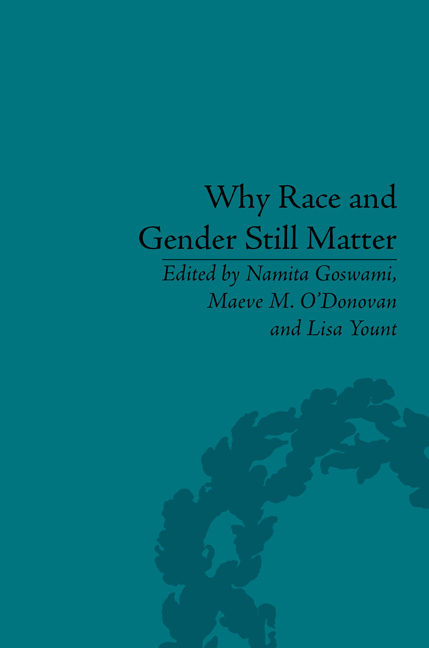Book contents
- Frontmatter
- CONTENTS
- Dedication
- Acknowledgements
- List of Contributors
- Introduction to Why Race and Gender Still Matter: An Intersectional Analysis
- Part I Defining Intersectionality
- Part II Doing Intersectionality
- 6 Continental Feminist Philosophy Meets Intersectionality: Rosi Braidotti's Work
- 7 Purposeful Nonsense, Intersectionality and the Mission to Save Black Babies
- 8 Transitional Subjects: Gender, Race and the Biopolitics of the Real
- 9 Caster Semenya: Reasoning Up Front with Race
- 10 Philosophical Happiness and the Relational Production of Philosophical Space
- 11 Theory Can Heal: Constructing an Ethos of Intervention
- Notes
- Index
11 - Theory Can Heal: Constructing an Ethos of Intervention
from Part II - Doing Intersectionality
- Frontmatter
- CONTENTS
- Dedication
- Acknowledgements
- List of Contributors
- Introduction to Why Race and Gender Still Matter: An Intersectional Analysis
- Part I Defining Intersectionality
- Part II Doing Intersectionality
- 6 Continental Feminist Philosophy Meets Intersectionality: Rosi Braidotti's Work
- 7 Purposeful Nonsense, Intersectionality and the Mission to Save Black Babies
- 8 Transitional Subjects: Gender, Race and the Biopolitics of the Real
- 9 Caster Semenya: Reasoning Up Front with Race
- 10 Philosophical Happiness and the Relational Production of Philosophical Space
- 11 Theory Can Heal: Constructing an Ethos of Intervention
- Notes
- Index
Summary
Introduction
I came to theory because I was hurting – the pain within me was so intense that I could not go on living. I came to theory desperate, wanting to comprehend –to grasp what was happening around and within me.
Once one acknowledges that where there are unequal distributions of social power, the distribution of credibility is likely to be distorted … This in turn enables one to identify a phenomenon of epistemic injustice which can arise from an unequal distribution of credibility … The remedy for this problem is not to remove barriers to women's knowledge, but to remove the barriers to credibility.
In ‘Feminism in Epistemology: Exclusion and Objectification’, Rae Langton describes the conditions by which women have suffered an epistemic injustice. According to Langton, this injustice is twofold insofar as it stems from two forms of denial of credibility: through omission, in which ‘women get left out’ and, more importantly, through commission, in that ‘women get hurt’ by failing to be ‘counted as knowers’. The commission of harm includes the ways in which ‘not counting’ also means not experiencing what it is to be counted – to be validated and treated as a credible participant in the work of knowledge generation. If, as Langton argues, the exclusion from knowledge generation is also a commission of harm against women, then future philosophy most urgently needs a revision in practice and disposition.
- Type
- Chapter
- Information
- Why Race and Gender Still MatterAn Intersectional Approach, pp. 179 - 190Publisher: Pickering & ChattoFirst published in: 2014



